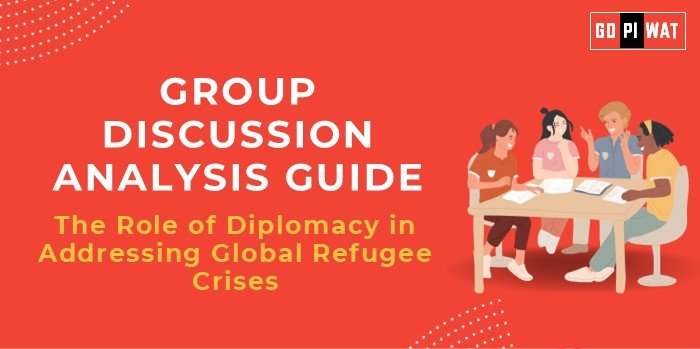📋 Group Discussion (GD) Analysis Guide
🌍 Topic: The Role of Diplomacy in Addressing Global Refugee Crises
📖 Introduction to the Topic
- 💡 Opening Context: With over 35 million refugees worldwide (UNHCR, 2024), global refugee crises are among the most pressing humanitarian challenges of our time. Diplomacy remains a critical tool for fostering collaboration, conflict resolution, and sustainable solutions.
- 📜 Topic Background: The United Nations Refugee Convention of 1951 laid the foundation for international refugee protection. However, recent geopolitical tensions, economic instability, and climate change have exacerbated displacement issues, making diplomatic engagement indispensable for solutions.
📊 Quick Facts and Key Statistics
- 🌍 Global Refugee Count: Over 35 million people displaced globally in 2024, highest in decades (UNHCR).
- 🏘️ Major Host Nations: 70% of refugees are hosted in developing countries, e.g., Turkey (3.5M), Uganda (1.5M).
- 💰 UNHCR Budget Gap: $1.7 billion funding shortfall in 2023, hindering relief efforts.
- ⚡ Geopolitical Hotspots: Syria, Afghanistan, and Ukraine among the top sources of refugees.
- 🌱 Climate Refugees: 20 million annually displaced due to climate-related disasters (World Bank).
🌍 Stakeholders and Their Roles
- 🏛️ United Nations (UN): Coordinating refugee policies and programs, particularly via UNHCR.
- 🌐 National Governments: Implementing asylum laws, hosting refugees, and managing local integration.
- 🤝 Non-Governmental Organizations (NGOs): Delivering humanitarian aid and advocating for refugee rights.
- 💼 Private Sector: Innovating solutions, such as housing or employment opportunities, for refugees.
- 👥 Host Communities: Adapting to demographic changes and fostering inclusion.
🏆 Achievements and Challenges
✨ Achievements
- 🌐 Global Agreements: Adoption of the Global Compact on Refugees (2018), enhancing international solidarity.
- 🏘️ Local Successes: Turkey’s “temporary protection” framework supports 3.5 million refugees.
- 🛠️ Private Sector Innovations: IKEA’s flatpack shelters used in refugee camps worldwide.
- 🌍 Regional Frameworks: Africa’s Kampala Convention addresses internally displaced persons.
⚠️ Challenges
- 📉 Lack of Resources: Funding gaps, especially in protracted crises like those in the Middle East.
- 🏥 Host Nation Strain: Overburdened healthcare and infrastructure systems in countries like Lebanon.
- 🚧 Political Resistance: Rise of anti-immigration policies and populism in several nations.
🌏 Global Comparisons
- ✔️ Success: Germany’s integration programs for Syrian refugees.
- ❌ Failure: EU’s fragmented asylum policies, highlighting inefficiencies.
📚 Case Studies
- 🇺🇬 Uganda: Progressive refugee policies allowing self-reliance through farming.
- 🇲🇲 Rohingya Crisis: Struggles with repatriation and international accountability for Myanmar.
💡 Structured Arguments for Discussion
- ✔️ Supporting Stance: “Diplomacy, through frameworks like the Global Compact on Refugees, has been instrumental in forging global solidarity and ensuring refugee rights.”
- ❌ Opposing Stance: “Diplomatic agreements often fail to translate into actionable outcomes due to insufficient funding and political resistance.”
- ⚖️ Balanced Perspective: “While diplomacy creates a framework for cooperation, its success depends on political will, adequate funding, and host nation capacity.”
📈 Effective Discussion Approaches
- 🗣️ Opening Approaches:
- 💬 Start with a recent crisis, e.g., the Ukraine war, to highlight the importance of international cooperation.
- 📊 Cite statistics about global displacement to underscore the scale of the crisis.
- 🔄 Counter-Argument Handling:
- 📈 Challenge anti-immigration rhetoric with economic contributions of refugees (e.g., Germany’s labor market).
- 🤝 Address funding concerns by citing successful public-private partnerships.
🔍 Strategic Analysis of Strengths and Weaknesses
- 💪 Strengths: Existing frameworks like UNHCR; growing public awareness.
- ⚠️ Weaknesses: Funding shortfalls; inconsistent policy implementation.
- 🚀 Opportunities: Innovative technologies; stronger multilateral agreements.
- 🌡️ Threats: Rising nationalism; climate change worsening displacement.
🎓 Connecting with B-School Applications
📚 Real-World Applications
Exploring public-private partnerships for crisis management. Developing sustainable business models for refugee integration.
📋 Sample Interview Questions
- 💬 “How can diplomacy address the root causes of forced migration?”
- 💬 “Evaluate the role of private sector innovations in refugee crises.”
💡 Insights for B-School Students
- 🌍 Importance of cross-cultural management skills.
- 📖 Opportunities in CSR and social entrepreneurship focusing on refugees.


